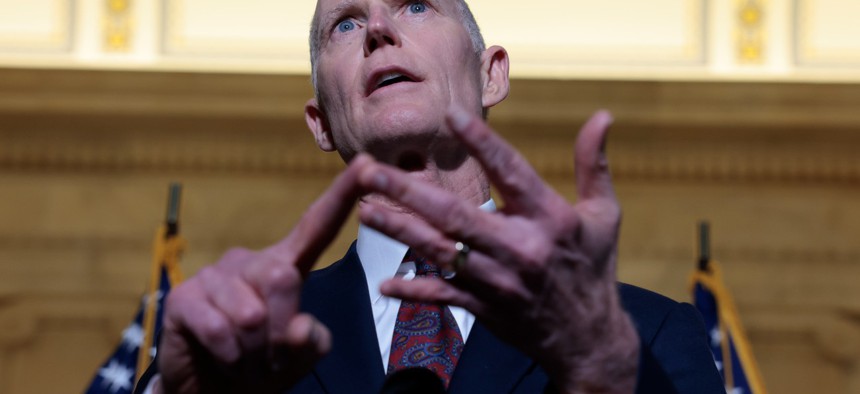
Sen. Rick Scott, R-Fla., is holding up the measure, which has bipartisan support. Anna Moneymaker/Getty Images
The Landmark Postal Reform Bill Hit an Unexpected Snag
One senator temporarily derailed plans to quickly pass the bill, but lawmakers vow to get it over the finish line eventually.
The much-coveted, long-delayed bill to overhaul the U.S. Postal Service will be delayed a bit longer after one senator on Monday objected to quickly ushering through a technical fix to a minor error in how the measure was logged.
Sen. Rick Scott, R-Fla., blocked the Senate from moving forward with the bipartisan 2021 Postal Reform Act, which won overwhelming support last week in the House. Lawmakers in both parties have attempted for years to eliminate much of the agency's debt and restructure some of its operations and the efforts appeared to finally reach a breakthrough with the successful vote in the lower chamber. The bill has the backing of 14 Republican senators, indicating broad support and votes that will ultimately clear the 60-member support threshold with ease.
When the House sent the bill to the Senate last week, however, it passed along the wrong version that did not include the most up-to-date text. The House on Friday quickly corrected the error by unanimously approving a measure to send over the correct version. Senate Majority Leader Chuck Schumer, D-N.Y., had already started the process of approving the incorrect bill last week and was hoping to move the House-backed technical correction on Monday with unanimous consent, allowing the chamber to resume consideration of the full bill.
That is when Sen. Rick Scott, R-Fla., objected, sending the process into chaos. The Senate is slated to recess on Friday and will likely not have time to pass the bill until after it returns in March.
Scott is blocking the same fix to a “minor clerical error” to which House Republicans and Democrats agreed last week, a Schumer spokesperson said.
“Senate Republicans keep saying they want bipartisanship but one of their leaders is standing in the way of the Senate from taking action this week on historic, bipartisan Postal Service reform,” the spokesperson said. “It is time for Senate Republicans to practice what they preach and rein in reckless Rick Scott’s political games so we can pass bipartisan legislation.”
A Scott spokesperson declined to comment on the events.
Schumer—who had vowed to send the postal bill to Biden’s desk by the end of the week—said on the Senate floor on Monday that the measure was the “definition of legislation that should sail through Congress.” The majority leader was visibly angry over the delay—saying Scott’s objection marked a “sad day”—but vowed the measure would still ultimately be signed into law. Scott agreed to allow the Senate to send the bill back to the House so it could send over the proper version.
“We will pass this bill because Americans need it,” Schumer said.
The bill would make sweeping changes to USPS operations, though its scope is slightly pared back compared to previous failed attempts at postal reform. The core of the bill will shift more postal retirees to Medicare for their health care and require most postal workers to select postal-specific health care plans. It would take onerous payments toward health care benefits for future retirees off the agency’s balance sheets. It would also require more oversight of the agency's investments and performance, including a new public website for tracking results. Postmaster General Louis DeJoy has endorsed the bill and said its core components were essential to eliminating projected losses over the next decade as part of his 10-year business plan.
Scott said on the floor he was concerned the measure had not gone through the committee process on the Senate side and about the funding for a potential increase in Medicare costs. The Congressional Budget Office said in a recent score the measure would save the government $1.5 billion over the next 10 years. Lawmakers have estimated it will save the Postal Service $50 billion over the same period.







